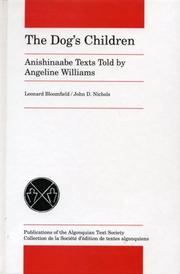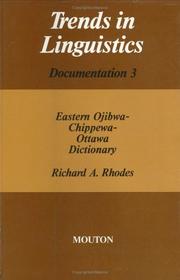| Listing 1 - 7 of 7 |
Sort by
|
Book
Year: 1791 Publisher: London printed for the author, and sold by Robson [etc.]
Abstract | Keywords | Export | Availability | Bookmark
 Loading...
Loading...Choose an application
- Reference Manager
- EndNote
- RefWorks (Direct export to RefWorks)
Indians of North America --- Indians of North America --- Languages --- Glossaries, vocabularies, etc. --- Fur trade --- Canada --- Chippewa language --- Glossaries, vocabularies, etc.

ISBN: 1283091194 9786613091192 0887553729 9780887553721 0887551483 9780887551482 Year: 1991 Publisher: Manitoba, Canada : The University of Manitoba Press,
Abstract | Keywords | Export | Availability | Bookmark
 Loading...
Loading...Choose an application
- Reference Manager
- EndNote
- RefWorks (Direct export to RefWorks)
These are a collection of 20 stories, dictated in 1941 to Bloomfield's linguistics class, edited from manuscripts now in the National Anthropological Archives at the Smithsonian Institution, and published for the first time. In Ojibwe, with English translations by Bloomfield. Ojibwe-English glossary and other linguistic study aids.
Ojibwa language --- Ojibwa Indians --- Algic language --- Anishinaabe language --- Anishinabe language --- Anishinaubae language --- Bawichtigoutek language --- Bungee language --- Bungi language --- Chipouais language --- Chippewa language --- Chippeway language --- Ochepwa language --- Odjibway language --- Ojebwa language --- Ojibuak language --- Ojibway language --- Ojibwe language --- Otchilpwe language --- Otchipwe language --- Salteaux language --- Saulteaux language --- Algonquian languages --- Social life and customs.
Book
ISBN: 1609173961 9781609173968 9781628961584 1628961589 9781611861051 1611861055 Year: 2014 Publisher: East Lansing
Abstract | Keywords | Export | Availability | Bookmark
 Loading...
Loading...Choose an application
- Reference Manager
- EndNote
- RefWorks (Direct export to RefWorks)
Bawaajimo: A Dialect of Dreams in Anishinaabe Language and Literature combines literary criticism, sociolinguistics, native studies, and poetics to introduce an Anishinaabe way of reading. Although nationally specific, the book speaks to a broad audience by demonstrating an indigenous literary methodology. Investigating the language itself, its place of origin, its sound and structure, and its current usage provides new critical connections between North American fiction, Native American literatures, and Anishinaabe narrative. The four Anishinaabe authors discussed in the book,
Ojibwa literature --- Ojibwa language --- Algic language --- Anishinaabe language --- Anishinabe language --- Anishinaubae language --- Bawichtigoutek language --- Bungee language --- Bungi language --- Chipouais language --- Chippewa language --- Chippeway language --- Ochepwa language --- Odjibway language --- Ojebwa language --- Ojibuak language --- Ojibway language --- Ojibwe language --- Otchilpwe language --- Otchipwe language --- Salteaux language --- Saulteaux language --- Algonquian languages --- Chippewa literature --- History and criticism. --- Folklore. --- Dialects
Book
ISBN: 1438468830 9781438468839 9781438468815 Year: 2018 Publisher: Albany, New York : State University of New York,
Abstract | Keywords | Export | Availability | Bookmark
 Loading...
Loading...Choose an application
- Reference Manager
- EndNote
- RefWorks (Direct export to RefWorks)
For the Anishinaabeg—the indigenous peoples of the Great Lakes—literary writing has long been an important means of asserting their continued existence as a nation, with its own culture, history, and sovereignty. At the same time, literature has also offered American writers a way to make the Anishinaabe Nation disappear, often by relegating it to a distant past. In this book, Adam Spry puts these two traditions in conversation with one another, showing how novels, poetry, and drama have been the ground upon which Anishinaabeg and Americans have clashed as representatives of two nations contentiously occupying the same land. Focusing on moments of contact, appropriation, and exchange, Spry examines a diverse range of texts in order to reveal a complex historical network of Native and non-Native writers who read and adapted each other's work across the boundaries of nation, culture, and time.By reconceiving the relationship between the United States and the Anishinaabeg as one of transnational exchange, Our War Paint Is Writers' Ink offers a new methodology for the study of Native American literatures, capable of addressing a long history of mutual cultural influence while simultaneously arguing for the legitimacy, and continued necessity, of indigenous nationhood. In addition, the author reexamines several critical assumptions—about authenticity, identity, and nationhood itself—that have become common wisdom in both Native American and US literary studies.
Ojibwa literature --- Ojibwa language. --- Ojibwa Indians --- Algic language --- Anishinaabe language --- Anishinabe language --- Anishinaubae language --- Bawichtigoutek language --- Bungee language --- Bungi language --- Chipouais language --- Chippewa language --- Chippeway language --- Ochepwa language --- Odjibway language --- Ojebwa language --- Ojibuak language --- Ojibway language --- Ojibwe language --- Otchilpwe language --- Otchipwe language --- Salteaux language --- Saulteaux language --- Algonquian languages --- Chippewa literature --- History and criticism. --- Government relations.
Book
ISBN: 1496218884 149621479X 9781496218889 9781496214799 9781496218872 9781496218865 9781496222268 1496222261 Year: 2020 Publisher: Lincoln
Abstract | Keywords | Export | Availability | Bookmark
 Loading...
Loading...Choose an application
- Reference Manager
- EndNote
- RefWorks (Direct export to RefWorks)
Ojibwa language. --- Algic language --- Anishinaabe language --- Anishinabe language --- Anishinaubae language --- Bawichtigoutek language --- Bungee language --- Bungi language --- Chipouais language --- Chippewa language --- Chippeway language --- Ochepwa language --- Odjibway language --- Ojebwa language --- Ojibuak language --- Ojibway language --- Ojibwe language --- Otchilpwe language --- Otchipwe language --- Salteaux language --- Saulteaux language --- Algonquian languages

ISBN: 311010203X 3110864347 Year: 2011 Volume: 3 Publisher: Berlin ; Boston : De Gruyter Mouton,
Abstract | Keywords | Export | Availability | Bookmark
 Loading...
Loading...Choose an application
- Reference Manager
- EndNote
- RefWorks (Direct export to RefWorks)
Chicago (see Zhgaagong, which may mean ""Place of the Skunk""). Kemo Sabe (see Giimoozaabi, which may mean ""he looks out in secret""), and Giche-gumi (from Longfellow's poem, see gchigami) are all words that came originally from algonquian languages and can be found in this dictionary. These languages have also given English such words as ""moccasin"" and ""wigwam"". In addition, words such as ""fire water"" (for hard liquor or whiskey) are direct translations from Algonquian languages. This 9,000 word dictionary gives information on the Ojibwa language, which is still spoken by over 45,000
North and Central American indian languages --- Amerindian languages --- English language --- Ottawa [Taal]. (Woordenboek, Engels) --- Engels. (Woordenboek Chippawa en Ottawa) --- Chippewa [Langue]. (Dictionnaire anglais) --- Ottawa [Langue]. (Dictionnaire anglais) --- Anglais [Langue]. (Dictionnaire Chippewa et Ottawa) --- Cippewa [Taal]. (Woordenboek, Engels) --- Ojibwa language --- Ottawa language --- Ojibwa. --- Ottawa. --- English. --- Odahwah language --- Odawa language --- Ottawaw language --- Outaouk language --- Tawa language --- Algonquian languages --- Algic language --- Anishinaabe language --- Anishinabe language --- Anishinaubae language --- Bawichtigoutek language --- Bungee language --- Bungi language --- Chipouais language --- Chippewa language --- Chippeway language --- Ochepwa language --- Odjibway language --- Ojebwa language --- Ojibuak language --- Ojibway language --- Ojibwe language --- Otchilpwe language --- Otchipwe language --- Salteaux language --- Saulteaux language --- Germanic languages
Book
ISBN: 1611863805 1609176553 1628954159 9781609176556 9781611863802 9781628954159 9781628964165 1628964162 Year: 2021 Publisher: East Lansing
Abstract | Keywords | Export | Availability | Bookmark
 Loading...
Loading...Choose an application
- Reference Manager
- EndNote
- RefWorks (Direct export to RefWorks)
Many of the English translations of Indigenous languages that we commonly use today have been handed down from colonial missionaries whose intent was to fundamentally alter or destroy prior Indigenous knowledge and praxis. In this text, author Mark D. Freeland develops a theory of worldview that provides an interrelated logical mooring to shed light on the issues around translating Indigenous languages in and out of colonial languages. In tandem with other linguistic and narrative methods, this theory of worldview can be employed to help root out the reproduction of colonial culture in Indigenous languages and can be a useful addition to the repertoire of tools needed to return to life-giving relationships with our environment. These issues of decolonization are highlighted in the trajectory of treaty language associated with relationships to land and their present-day importance. This book uses the 1836 Treaty of Washington and its contemporary manifestation in Great Lakes fishing rights and the State of Michigan's 2007 Inland Consent Decree as a means of identifying the role of worldview in deciphering the logics embedded in Anishinaabe thought associated with these relationships to land. A fascinating study for students of Indigenous and linguistic disciplines, this book deftly demonstrates the significance of worldview theory in relation to the logics of decolonization of Indigenous thought and praxis.
Indians, Treatment of --- Ojibwa Indians --- Ojibwa language --- #SBIB:Decolonizelibraries --- Algic language --- Anishinaabe language --- Anishinabe language --- Anishinaubae language --- Bawichtigoutek language --- Bungee language --- Bungi language --- Chipouais language --- Chippewa language --- Chippeway language --- Ochepwa language --- Odjibway language --- Ojebwa language --- Ojibuak language --- Ojibway language --- Ojibwe language --- Otchilpwe language --- Otchipwe language --- Salteaux language --- Saulteaux language --- Algonquian languages --- Algic Indians --- Anishinabe Indians --- Bawichtigoutek Indians --- Bungee Indians --- Bungi Indians --- Chipouais Indians --- Chippewa Indians --- Lac Courte Oreilles Indians --- Ochepwa Indians --- Odjibway Indians --- Ojebwa Indians --- Ojibua Indians --- Ojibwauk Indians --- Ojibway Indians --- Ojibwe Indians --- Otchilpwe Indians --- Otchipwe Indians --- Salteaux Indians --- Saulteaux Indians --- Algonquian Indians --- Indians of North America --- Indians --- Social aspects --- Politics and government --- Government relations --- Ojibwa language. --- Politics and government. --- Government relations.
| Listing 1 - 7 of 7 |
Sort by
|

 Search
Search Feedback
Feedback About
About Help
Help News
News